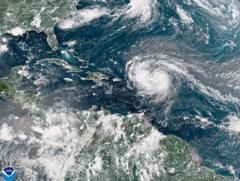2024 has set a new benchmark as the hottest year on record, edging closer to the controversial 1.5°C global warming limit, triggering warnings from international leaders about the escalating climate crisis.
Rising Temperatures: 2024 Attains Record Heat Amid Warming Crisis

Rising Temperatures: 2024 Attains Record Heat Amid Warming Crisis
Global data reveals 2024 as the first year exceeding the 1.5°C temperature limit, underscoring urgent climate concerns.
The year 2024 is officially recorded as the first to break the significant threshold of 1.5°C above pre-industrial levels, according to the latest findings from the European Copernicus climate service. This alarming milestone comes despite global commitments made a decade ago to curb climate change. The data reveals that average global temperatures reached approximately 1.6°C above pre-industrial averages, making it the hottest year ever documented.
While this figure doesn't signify that the international climate target has been officially surpassed—since it pertains to long-term averages—it does highlight an unsettling trajectory as greenhouse gas emissions remain at historically high levels. UN Secretary-General António Guterres emphasized the stark reality of "climate breakdown," insisting nations must drastically reduce emissions of greenhouse gases by 2025 to avert catastrophe.
With the last decade representing the warmest years on record, the implications of such rising temperatures are profound. Influenced by human activities, particularly fossil fuel combustion, the climate is changing with accelerating momentum. Additional factors, such as the natural El Niño weather pattern, though influential, played a less significant role compared to anthropogenic climate drivers.
The importance of the 1.5°C limit has intensified since its establishment in the 2015 Paris Agreement, regarded as pivotal for the survival of vulnerable nations. In light of new assessments, experts predict that if current emissions continue, the world could breach this milestone by the early 2030s—a politically charged point that nonetheless does not negate the urgency of mitigating climate impacts.
Climate scientists stress that even slight increases in temperature could exacerbate weather extremes. For instance, 2024 brought unprecedented weather events globally, from severe heatwaves in West Africa to destructive storms in North America. With California facing intense wildfires fueled by preconditions strengthened by climate change, the consequences of rising temperatures have never been more evident.
Researchers point to the expansive reach of climate change, with rising sea surface temperatures and elevated atmospheric moisture also breaking records in 2024. This pattern aligns with ongoing predictions of elevated global heating as a result of human activity and natural phenomena like El Niño.
Amidst uncertainties regarding the precise causes and sustainability of accelerated warming, scientists reaffirm that mitigating climate change remains within human capacity through strategic reductions in greenhouse gas emissions. Experts propose that while crossing the 1.5°C threshold is unnerving, it is essential to limit warming to levels that minimize catastrophic outcomes.
The climate crisis continues to pose substantial challenges, provoking discussions on proactive measures and global policy responses critical for a sustainable future.




















